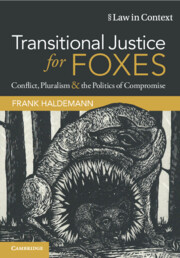4 - Compromise
Published online by Cambridge University Press: 24 November 2022
Summary
This chapter explores the place of compromise in transitional justice. While all-pervasive in politics, compromise is a neglected topic, almost a non-topic, within the current transitional justice literature. The chapter is an attempt to reverse this tendency and rehabilitate the notion of compromise. If, as pluralists hold, we are often faced with cases of hard moral choices where, whatever we do, something of value is irreparably lost, then the best we can hope for is some kind of acceptable compromise between clashing goods. The question about the limits of compromise thus features centrally in this chapter. How far should transitional societies go in their willingness to compromise? When is a compromise acceptable, fair, guided by principle, and when is it rotten to the core, simply illegitimate? To what extent is it acceptable to compromise deeply held values such as justice and truth for the sake of other equally important values such as, say, civil peace and democracy? While doubtful that we can settle such issues once and for all, the chapter identifies a range of questions that should be part of the collective conversation about when a political compromise is acceptable and when it is not. The discussion begins, however, with a concrete historical figure, the communist leader Joe Slovo, who played a critical role in South Africa’s negotiated transition from apartheid to democracy. Slovo’s reflections on the nature and limits of compromise in the South African context serve as a central reference point for my discussion throughout this chapter.
Keywords
- Type
- Chapter
- Information
- Transitional Justice for FoxesConflict, Pluralism and the Politics of Compromise, pp. 146 - 200Publisher: Cambridge University PressPrint publication year: 2022



